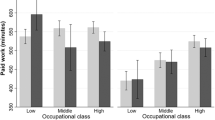Play all audios:

ABSTRACT THE production drive in Great Britain which started a month ago has led to a very great extension of working hours throughout industry. We would urge that this matter should receive
the attention of scientists for the following reasons. It is necessary that a scientific attitude should be maintained towards the relation between hours of work and productivity of factory
labour; it was established by experience during the War of 1914–18 that increased hours of work did not in all circumstances lead to greater production. Scientific workers as well as
factory hands in industry and in Government service are also being asked to work longer hours, and it is uncertain what holidays will be granted. SIMILAR CONTENT BEING VIEWED BY OTHERS
REVISITING THE ‘FLEXIBILITY PARADOX’: DEGREE OF WORK SCHEDULE FLEXIBILITY AND TIME USE PATTERNS ACROSS GENDER AND OCCUPATIONAL GROUPS Article Open access 06 November 2023 WORK STRESS, HEALTH
AND WELLBEING: EVIDENCE FROM THE OLDER ADULTS LABOR MARKET IN INDIA Article Open access 16 June 2022 HYBRID WORKING FROM HOME IMPROVES RETENTION WITHOUT DAMAGING PERFORMANCE Article Open
access 12 June 2024 ARTICLE PDF AUTHOR INFORMATION AUTHORS AND AFFILIATIONS * Association of Scientific Workers, 30 Bedford Row, London, W.C.1 W. A. WOOSTER Authors * W. A. WOOSTER View
author publications You can also search for this author inPubMed Google Scholar RIGHTS AND PERMISSIONS Reprints and permissions ABOUT THIS ARTICLE CITE THIS ARTICLE WOOSTER, W. Relation of
Working Period to Output. _Nature_ 145, 1024 (1940). https://doi.org/10.1038/1451024a0 Download citation * Issue Date: 29 June 1940 * DOI: https://doi.org/10.1038/1451024a0 SHARE THIS
ARTICLE Anyone you share the following link with will be able to read this content: Get shareable link Sorry, a shareable link is not currently available for this article. Copy to clipboard
Provided by the Springer Nature SharedIt content-sharing initiative
